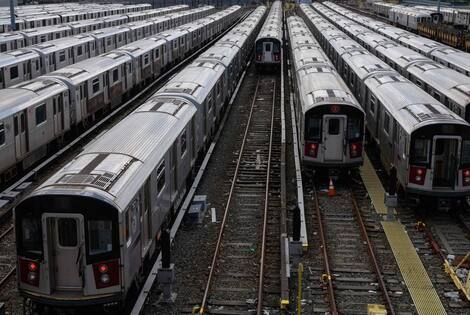The trend may seduce on social networks, but it is dangerous, to the death: in New York, the authorities are trying to stop the trend of “subway surfing”, which consists of putting yourself on the stage by climbing on the roof of a moving metro.
• Read also: Killed while “surfing” on a subway
Isa Islam is one of those who will regret all his life to have gone to seek, at 17, his “adrenaline rush”, as he tells AFP. That evening in November 2013, with two cousins, he had climbed onto the roof of a car in an underground station on the F line in Brooklyn.
On his first – and last – attempt, his head hit a metal beam, blood spurting out, and the injuries left him partially blind. “It was extremely stupid,” he says today. “If there’s anyone who needs a time machine, it’s me,” he adds.
Isa, who had spent six weeks in the hospital, and underwent “numerous” operations, survived, but some are less fortunate. In February, a 15-year-old boy died after falling from the roof of a running subway. Another teenager, from the Bronx, died in December.
After these accidents, the New York police recalled that the subway was “not a playground” and that getting on a moving car is illegal. Even on New York’s photogenic network, the largest in the United States (more than 400 stations), where the airways offer spectacular views of the city.

photo-source position-absolute" itemprop="copyrightHolder"> AFP
The Metropolitan Transportation Authority (MTA), which runs the public transport network, called for social media accountability by pointing to TikTok, Instagram or Snapchat.
According to the MTA, the release of videos on the networks last spring and summer boosted the popularity of the challenge.
It identified 928 reports of people traveling outside of cars, more than four times more than in 2021, and almost double from 2019 (490), the last year before the Covid pandemic.
“If they released videos of people playing Russian roulette with live bullets, they would realize the consequences. It’s the same for those children who are encouraged by these glorification videos,” MTA CEO Janno Lieber recently lambasted.
A spokesperson for TikTok told AFP that the network “does not display videos of known dangerous behavior in search results”, even ensuring that it directs searches to guidelines stating that this type of content is not authorised.
Snapchat responds that it “immediately removes” “subway surfing” videos if it becomes aware of them. One of these spokespersons also explains that contacts have been made with the MTA “to discuss the measures that we can take to prevent the dissemination of this content”.
The trend is also reminiscent of the video game “Subway surfers”, popular on mobile applications, where the hero, a graffiti artist, jumps from train to train and runs on the tracks to escape a policeman.
But in real life, “it’s not a video game”, warns Isa Islam, who today delivers his message of prevention within an association, “Breaking the Cycle”.
“110% don’t do it,” he pleads.


